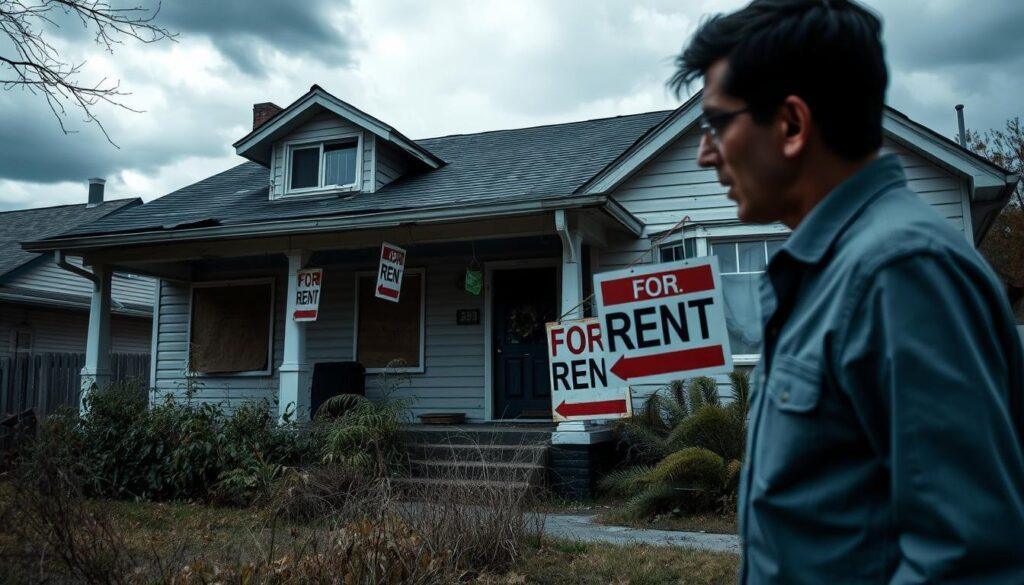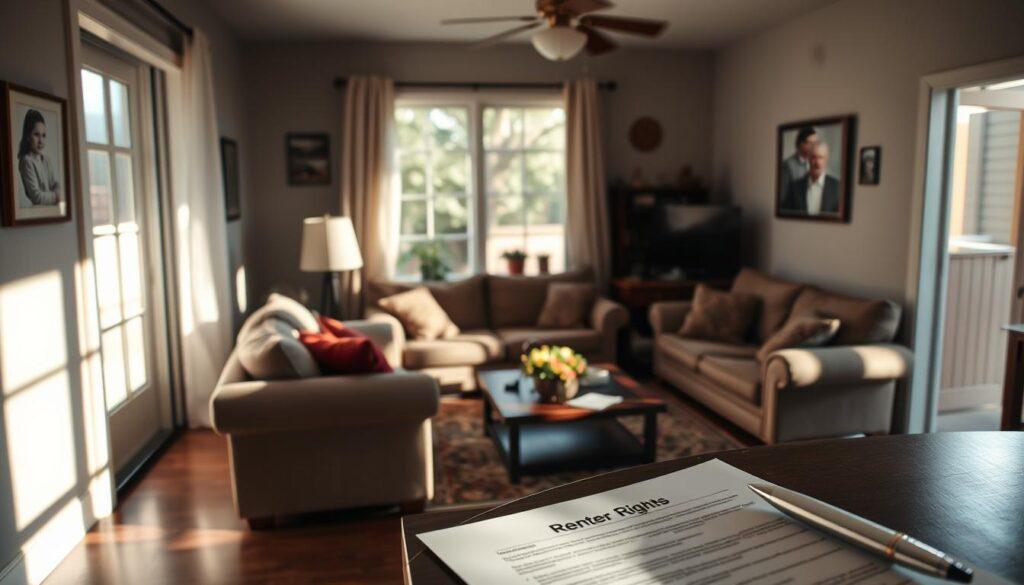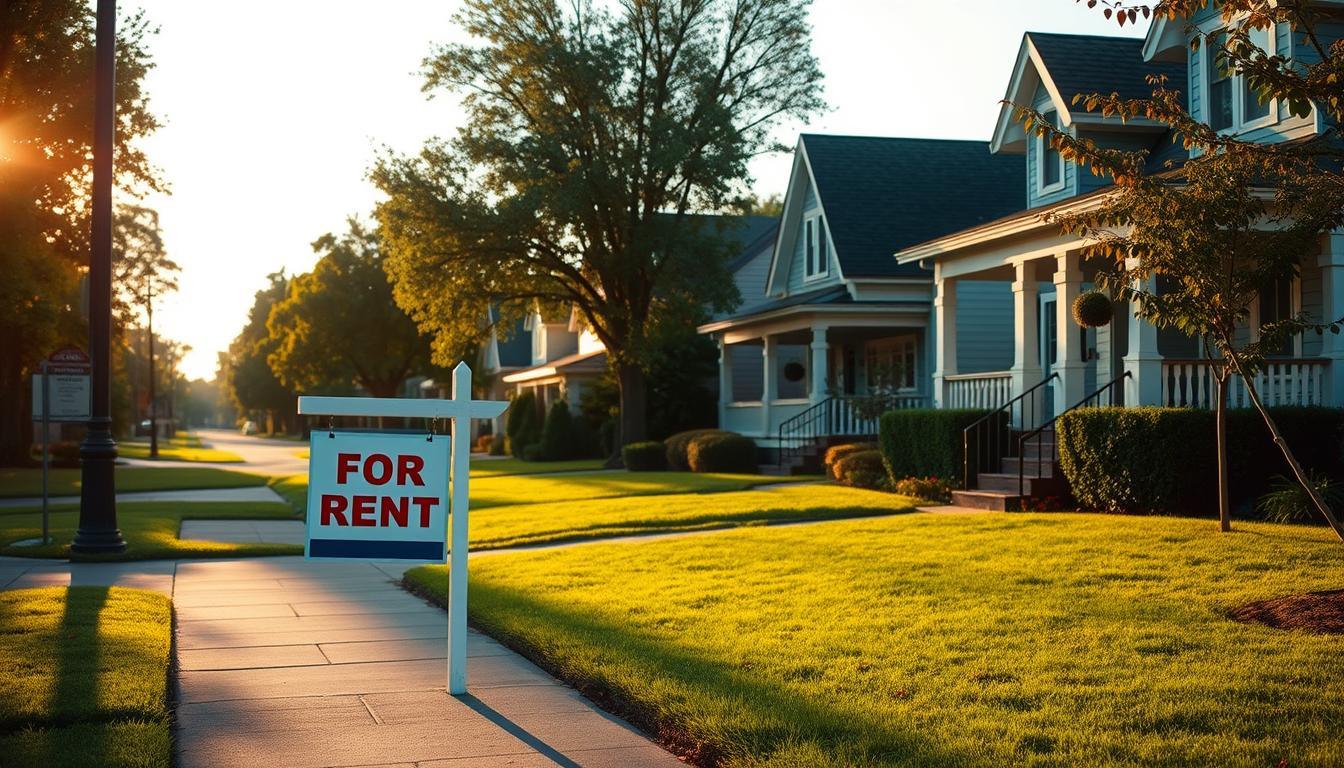Ever thought about finding a great deal in the rental market through pre-foreclosure homes? Many homeowners face financial struggles, making these homes more appealing. But, is it safe to rent a pre-foreclosure home? Knowing the ins and outs of this stage can greatly impact your experience.
Renting these homes might offer lower prices. Yet, it comes with its own set of challenges like lease issues and eviction risks. To better understand pre-foreclosure, check out this detailed guide that explains more about it.
Key Takeaways
- Pre-foreclosure presents distinct challenges and opportunities for renters.
- Understanding the legality of renting a pre-foreclosure property is essential.
- Lower rental prices may attract tenants to pre-foreclosure homes.
- Potential risks include eviction and uncertainty regarding lease agreements.
- The Protecting Tenants at Foreclosure Act provides certain protections for tenants, but not all.
Understanding Pre-Foreclosure Homes
To understand pre-foreclosure homes for rent, knowing what pre-foreclosure means is key. It’s when a homeowner misses three mortgage payments in a row. At this point, lenders send a Notice of Default to the homeowner. This notice opens the door for talks and solutions.
What is Pre-Foreclosure?
Homeowners in pre-foreclosure have several options. They can talk to lenders about payments or try to modify their loan. Some might sell their home to avoid bankruptcy. Selling can also help them find more affordable housing later.
The Foreclosure Process Explained
The foreclosure process has several important steps. Here’s a quick rundown:
| Step | Description |
|---|---|
| 1. Default Notice | Lender issues a Notice of Default after missed payments. |
| 2. Pre-Foreclosure | Homeowner works on options to avoid foreclosure. |
| 3. Foreclosure Proceedings | If unresolved, the lender begins legal action to recover the property. |
| 4. Auction | The property is sold at public auction to recover the owed amount. |
Knowing about foreclosure is crucial for renters looking at pre-foreclosure homes. This knowledge helps renters understand their rights and risks during this time.
Can You Rent a Pre-Foreclosure Home?
Renting homes in pre-foreclosure is an interesting option, but it’s complex. The rules about renting in pre-foreclosure differ by state. It’s key for renters to know their rights and duties before signing a lease.
Legality of Renting in the Pre-Foreclosure Stage
In many places, landlords can rent out homes before foreclosure. For example, in Nevada, landlords must tell potential renters if the home is at risk of foreclosure. This is to keep things clear, as shown in NRS 118A.275(1).
Not following this rule can lead to legal trouble for landlords. They might face lawsuits for unfair business practices.
Tenants should check if a home is in foreclosure before renting. Even if landlords follow the law, it’s not always the case. In Nevada, tenants have the right to end their lease if they get a Notice of Default. This law helps protect renters during tough times.
Considerations for Tenants
Thinking about renting a home in pre-foreclosure? It’s important to know the risks. The home’s foreclosure status can make your living situation unstable. It’s wise to talk to legal experts who know about foreclosures.
Also, keep an eye out for any notices or documents about the property. Being proactive can help protect your rights. Working with real estate agents who deal with pre-foreclosure homes can also give you useful advice.
| State | Disclosure Requirement | Tenant Protections |
|---|---|---|
| Nevada | Written disclosure of foreclosure status required | Lease termination rights upon Notice of Default |
| Maryland | Obligations vary; check local laws | Protections under the Protection of Homeowners in Foreclosure Act |
| California | Disclosure may be mandated; varies by locality | Legal safeguards for renters, specific to situations |
Potential Benefits of Renting Pre-Foreclosure Homes
Renting pre-foreclosure homes has many advantages, especially for those on a tight budget. One big plus is the chance to find lower rental prices. This is because landlords facing financial issues often set their rates lower to attract tenants fast.
Lower Rental Prices
Pre-foreclosure homes can save renters a lot of money on rent. This is because owners in trouble try to make more money by lowering their prices. This can be a great chance for people to find a home without spending too much.
Opportunity to Negotiate Terms
Another benefit is the chance to negotiate better terms. Since landlords need tenants quickly, they might be open to discussing things like payment plans or longer leases. This could mean getting a deal that fits your needs better.
Before deciding, it’s key to weigh the pros and cons of renting pre-foreclosure homes. Knowing your rights and the market can help you find a good rental.
This link provides further informationon the benefits of renting pre-foreclosure properties
Challenges of Renting Pre-Foreclosure Properties
Renting pre-foreclosure homes comes with its own set of challenges. One big issue is the uncertainty of lease validity. If a homeowner gets a notice of default, the foreclosure process starts. Even with a signed lease, tenants might get evicted with little notice.
Uncertainty of Lease Validity
Before renting a pre-foreclosure home, tenants should know the risks. When a property is in pre-foreclosure, tenant rights can be at risk. If the bank takes over, tenants might have to leave, even with a lease.
This uncertainty is a major challenge of renting pre-foreclosure properties. It can impact financial planning and stability.
Risks of Eviction and Loss
There are also risks of eviction and financial loss. A landlord under financial stress might stop collecting rent. This can cause instability for tenants. With properties needing investment, tenants must consider the risks of lower prices.
Getting advice from a legal expert who knows pre-foreclosure situations is wise. They can help tenants make informed decisions.

How to Identify Pre-Foreclosure Rental Properties
Finding pre-foreclosure rentals can be exciting but also challenging. Using the right pre foreclosure rentals search strategies helps uncover hidden gems. Online resources and networking are key to finding these properties. Here are some effective ways to spot pre-foreclosure rentals.
Search Strategies for Finding Listings
Trusted platforms are crucial for finding pre-foreclosure rentals. Sites like Zillow and Foreclosure.com are top choices. Foreclosure.com even offers a free trial to help you start without cost. Other reliable sites include Preforeclosure.com, Realty TRAC, FlipScout, REDEX, List Source, and Property Shark.
Public records are also a good source. They offer detailed information on property owners and addresses. Look for foreclosure notices in local newspapers, usually in the legal section.
Using Real Estate Agents and Online Resources
Local real estate agents who specialize in distressed properties can be very helpful. They have the latest listings and can find deals before they hit online platforms. Networking with these agents can give you insights into the market and access to hidden properties.
For a more hands-on approach, consider working with wholesalers. They often have access to properties at lower prices. Building a network with attorneys and bird dogs can also lead you to distressed owners looking for quick deals.
Renting Homes in Pre-Foreclosure
Renting homes in pre-foreclosure comes with its own set of challenges and chances. It’s key to know the legal rights of renters in this situation. Even in pre-foreclosure, tenants have protections like rules on moving and security deposits.
Legal Rights of Tenants
Tenants in pre-foreclosure properties need to know their legal rights. The Protecting Tenants at Foreclosure Act (PTFA) gives renters a 90-day notice before they must leave. Renters with longer leases can stay until their lease ends, unless the new owner wants to live there.
States like California and New Jersey also protect tenants during foreclosure. They have laws on rent control and “just cause” evictions. Knowing these laws can help renters deal with evictions and losing security deposits.
Tips for Protecting Yourself as a Renter
To protect yourself while renting in pre-foreclosure, take these steps:
- Document all communications with the landlord and keep accurate records of rental payments.
- Seek legal advice from professionals knowledgeable in foreclosure matters to better understand personal rights.
- Confirm the ownership of the property post-foreclosure by checking the courthouse for mortgage information.
- Inquire about possible cash for keys agreements which may provide moving assistance from new property owners.
- If receiving government assistance, such as a Section 8 voucher, contact local housing authorities for specific protections.
Knowing these tips can greatly improve a tenant’s safety and peace of mind. As financial issues continue, it’s vital to stay informed about legal rights to protect oneself in the rental market.

Tips for Renting Pre-Foreclosure Properties
Renting pre-foreclosure properties can be a great option for many. It’s important to understand the landlord’s situation and negotiate lease terms well. This can make your rental experience much better.
Evaluating the Landlord’s Situation
When looking at pre-foreclosure rentals, it’s key to know the landlord’s financial state. Find out if they’re trying to keep up financially or want to sell soon. Talking openly about their goals can help you find common ground.
Landlords of single properties might be more flexible than big complexes. They might be willing to overlook credit issues. This can lead to more personalized rental deals.
Negotiating Your Lease Terms
When negotiating lease terms, you’re protecting your interests. Learning tips for renting pre-foreclosure properties can help you negotiate better. Make sure to discuss potential risks, like quick eviction notices.
The Protecting Tenants at Foreclosure Act offers some protection. It requires a 90-day notice before eviction for tenants in good standing. To increase your chances, offer a higher security deposit or include a cosigner. This can make landlords more willing to accept you.
| Factor | Description |
|---|---|
| Income Ratio | Renters need a monthly income at least three times the rent to show they can pay. |
| Landlord Type | Individual landlords might offer more flexible terms than big complexes. |
| Security Deposit | A higher deposit can help you get approved by reducing the landlord’s risk. |
| Cosigner | Having a cosigner can boost your approval chances and offer extra security for the landlord. |
| PTFA Protections | Renters get protections under the Protecting Tenants at Foreclosure Act, allowing them to stay under certain conditions. |
By understanding and negotiating well, you can have a smoother rental experience in pre-foreclosure properties.
Conclusion
Renting pre-foreclosure homes can be a great deal for tenants. They often find lower prices and more flexible lease terms. But, it’s important to be careful because of legal risks and lease uncertainty.
Knowing how pre-foreclosure works is key. It helps you understand the challenges of renting these properties. Tenants should know their rights and carefully check rental agreements. Working with real estate pros and lawyers can help a lot.
Even though renting pre-foreclosure homes has its perks, you must do your homework. Being well-informed and ready can make your rental experience better. It helps avoid problems and makes moving in smoother.






